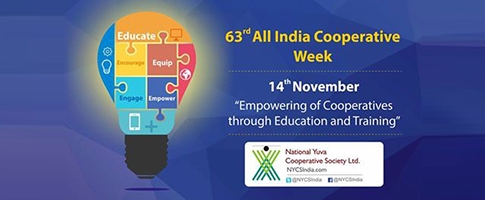Empowering Of Cooperatives Through Education And Training
Empowering Of Cooperatives Through Education And Training

What Is Training?
Training is developing oneself or others, by imparting skills and knowledge that relate to specific useful competencies with the goal of improving capability, capacity, productivity and performance of an individual and the organization he or she works for. Training is an organized procedure by which people learn knowledge and/or skill for a definite purpose. Training is not only required to find a job or choose a profession to make a living but to pace beyond the basic qualifications to upgrade the skills and sharpen the axe throughout work life.
Thus, Training and Education has to be looked as a process of living and not mere preparation of future living. It has to be a conscious and optimistic process to learn new methods, processes, skills and technologies to match the walk with changing times. It should be conversant, respectful and wise that opens different promising avenues of fruitful probabilities and it should be with a cooperative desire to share the knowledge so that all may flourish with the same in life.
Why Is Training Necessary?
Life is a school which is always in progress and while education and training is the process, learning is the valuable outcome. In the backdrop of ever changing parameters of development it is imperative to understand the importance, implication and impact of persistent training process and program. A few factors can be enumerated as follows for the same:
a) Transformation in the economic ecosystem: Organizations need to train the employees with the latest technological advances to meet the speed of evolving computerization, automation and mechanization in every field.
b) Organizational Complexity: With globalization, expansion and diversification of business activities, introductory as well as specialized trainings in emerging subjects for an organization have gained importance.
c) Intrapersonal and Interpersonal Harmony: An organization is only as good enough as its human force. For optimum productivity, minimal differences should be maintained. One cannot be at odds with others and expect even success. Soft skill trainings are gaining momentum in all business models including cooperative organizations.
d) Role Matching: Right person at right place, rightly steers the vehicle of organizational economy towards right direction. Training is essential to fill in the gaps of skills present, skills acquired and skills rightly needed.
Training In cooperatives
The cooperative business model in today’s era cannot be not compared to private or corporate business models and hence has to face similar challenges or more to adjust to the increasing competitive environment. Cooperatives need to develop their capacity to continually re-invent themselves and offer new goods and better services. Cooperatives have a great deal to gain by analysing their training needs, develop entrepreneurial approaches in members and stakeholders. Training and education Programmes should be aimed as one of its major objectives, to strengthen local and national capacities to improve cooperative development.
Cooperative Training Model In India
The National Council for Cooperative Training (NCCT) is a government initiative to organise need-based training programmes and research in critical areas of cooperative movement. The three tier training Structure of NCCT comprises of the apex centre Vaikunth Bhai Mehta National Institute of Cooperative Management (VAMNICOM), Pune with Five Regional Institutes of Cooperative Management at Chandigarh, Bangalore, Kalyani, Gandhinagar, Patna and Fourteen Institutes of Cooperative Management at Bhopal, Bhubaneswar, Chennai, Dehradun, Guwahati, Hyderabad, Imphal, Jaipur, Kannur, Lucknow, Madurai, Nagpur, Pune & Thiruvanathapuram. These institutes run a Higher Diploma in Cooperative Management (HDCM) with the aim to develop change agents in cooperatives who can motivate members and managing committee members to participate in the management of cooperative enterprises and achieve the enterprise goals. Some large cooperatives in the country have their own training centres to cater to their employees like cooperative banks(DCC,SCB,NABARD). National Centre for Cooperative Education and Junior Cooperative Training Centres all across India are running diplomas in cooperative education, leadership programs for the directors and also to colleges, institutions to keep them abreast the latest changes in cooperative movement.
NYCS’s Overview of Education and Training
Cooperatives around the world generally operate according to the same core principles and values. A cooperative is built with members coming from all diverse streams of activities, geography and profession. According to the Cooperative Principle #5: Education, Training, and Information , NYCS provides education and training for members, elected representatives, managers and employees so they can contribute effectively to the development of the cooperative. Education about the goals, objectives and plans is one of the most important means of empowering them with the knowledge, skills and self-confidence necessary to participate fully in the development process of NYCS. Members can then inform the general public about the nature and benefits of their cooperative only after being conversant themselves.
NYCS celebrated the 63rd All India Cooperative Week between 14th to 20th November. The date of 14th November had a theme dedicated to the empowermentof cooperatives through education and training. NYCS pledges and plans to continue arranging education and training workshops for all the members and others stakeholders of the society from time to time, as it has always been doing so. NYCS under its program KOVIDA offers skill development, entrepreneurship development, incubation support, faculty development, management development, soft skills and life skills training programs. We are amidst such training workshops for the #NYCSGailRaftaar project involving all the State and District Representatives. An educated cooperative can contribute in the education of the society and "Keep Educating Yourself" can only be the KEY to sustainable development and growth.

